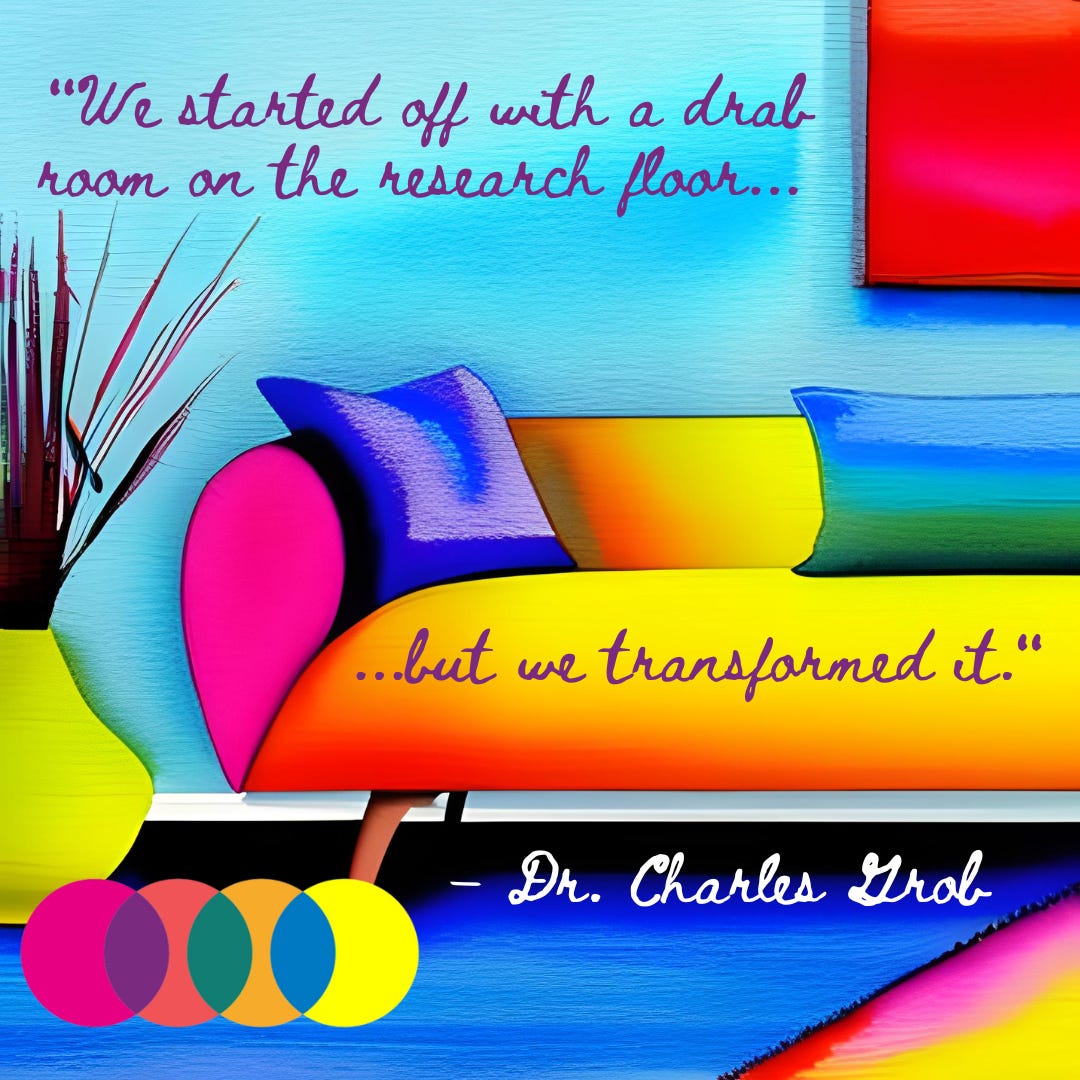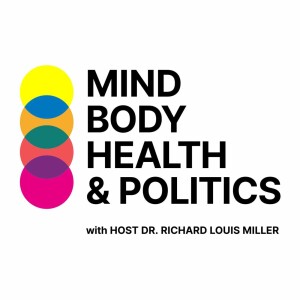
Exploring the Potential of Psychedelic Therapy with Dr. Charles Grob
 2023-06-20
2023-06-20
Dear listeners,
This week, I am attending the historic MAPS psychedelic science conference in Denver—along with my guest, UCLA psychiatrist and psychedelic researcher Charles Grob. Thanks to the research of pioneers like Grob, we are winning hearts and minds in the mainstream. Nixon’s failed War on Drugs appears ending.
On Thursday, June 22, at 12 pm MT, I will take to the Rick Doblin stage to announce a nationwide campaign to decriminalize psychedelics locally. I believe that these medicines have the potential to boost morale in depressed areas like my own home town of Ft. Bragg, which is why I have begun my efforts there. We appear to be succeeding, based on the positive response by city officials and local media.
But the fight continues on several new fronts.
First, new industries emerging where psychedelics are legal see unethical actors—unqualified “therapists” and profit-driven pharmaceutical companies. As Dr. Grob reminds us in this week’s interview, we need oversight.
We are also hearing more stories of adverse effects in vulnerable groups. We lack data—both scientific and anecdotal. I’m soliciting stories of negative experiences for my forthcoming series, and invite you to share yours.
Yet despite risks and adverse effects, we must continue to expand access. Criminalization prevents honest, law-abiding citizens from accessing these profound tools. With open yet responsible guidance, psychedelics’ healing promise can be fulfilled.
These treatments aren’t for everyone; we need more trained professionals and standards for guides—whether from government or private certifying bodies. But above all, we need open and honest discussion. I aim to provide transparent information.
Toward this end, I will soon be making my transcripts and videos accessible to all subscribers. If you are a paid subscriber, I would like your input on what kind of premium/exclusive content you would like me and my team to produce.
Please email my producer your suggestions at producer@mindbodyhealthpolitics.org with your ideas.
Golden light,
Dr. Richard L. Miller
Key Takeaways:
* Dr. Charles Grob's research has focused on end-of-life care, building upon the work of researchers from previous generations, such as Stan Grof.
* Psychedelic research still faces regulatory hurdles and needs further study.
* Eric Kast learned in the 1960s that set and setting were crucial for optimizing outcomes and minimizing harm.
* Diversity and inclusion are crucial for ethical research.
* For-profit companies may prioritize profits over patients, so government oversight is needed to balance commercial interests with public health.
* Trained health professionals are preferred to ensure safety.
* Close screening and monitoring are needed to minimize risks, especially for vulnerable groups.
* With care and responsibility, psychedelic tools may help revive well-being and human connection in times of deepest despair.
Links and references:
* Psychedelic Wisdom
* MAPS psychedelic science conference
* Charles Grob
* Stan Grof
The podcast and abbreviated notes are always freely available thanks to our paid subscribers. Please share this post to show your support for transparency.
The following article distills the key points from this show into a condensed form. Consider becoming a paid subscriber to access the full transcripts, and support our broadcast.
The therapeutic potential of psychedelics
New studies on psilocybin and MDMA have shown promising results for applications such as end-of-life care and the treatment of anxiety and depression, including the work of my most recent guest, Dr. Charles Grob of UCLA medical school.
Much of Dr. Grob’s seminal research has focused on end-of-life care, building upon the work of researchers from previous generations, such as Stan Grof.
Dr. Grob points out that “the use of a psychedelic treatment model for people experiencing significant anxiety approaching the end of life really started in the early 1960s.”
One pioneer was Eric Kast, a physician in Chicago, who obtained LSD from Sandoz Pharmaceuticals to treat chronic pain and anxiety in terminally-ill patients. Kast learned that set and setting were crucial for optimizing outcomes and minimizing harm. Set refers to a person’s mindset and intention. Setting refers to the environment and conditions.
“Kast understood how to safely administer the drug. He treated many patients with chronic pain and found impressive results, including reduced pain, less anxiety, and improved quality of life.”
While promising, psychedelic research still faces regulatory hurdles and needs further study. As Grob told me, “The D.E.A. has strict rules for studying Schedule 1 drugs.”
Researchers follow strict protocols to obtain and store substances like psilocybin and MDMA. Grob said he hopes that “the government creates funding and oversight for optimal safety.”
More research is also needed to understand benefits and risks, especially for vulnerable groups. Grob recalled a tragedy that highlights the need for caution: “A few years ago, a seventy-four-year-old man tried mushrooms for the first time. Within an hour, he died of cardiac arrest. He may have had a heart condition triggered by psilocybin. This shows we need to understand psychedelics’ effects, especially in vulnerable people.” While anecdotal, the story indicates the need to closely monitor at-risk patients.
Clearly, more research and oversight can fully illuminate psychedelics’ risks and benefits to enable their safe use, particularly in medical settings. Recent studies suggest psychedelics may relieve conditions like chronic pain, anxiety, depression, and PTSD. With safety precautions and approvals, psychedelics could revolutionize fields like psychotherapy and end-of-life care. Rigorous research is critical to understanding them.
Optimizing safety and ethics in psychedelic research
As Grob has emphasized, “The success of this field depends on maintaining strong safety standards.”
He outlined six principles for ethical research:
* optimizing safety;
* learning from past mistakes;
* promoting diversity and inclusion;
* navigating regulations;
* choosing funding carefully; and
* strengthening ethics.
Learning from past mistakes, like irresponsible research practices, is critical.
“We owe a debt to early researchers from the fifties and sixties. We must also learn from indigenous groups who’ve used these plants for millennia.”
Many understood how to prepare subjects, guide experiences, and help them integrate insights—all while preventing harm.
Diversity and inclusion are also crucial.
“Most subjects and researchers have been middle-class, white, and male. We need more women, minorities, and people of color.”
Their voices can enrich discussions on safety, access, and therapeutic approaches.
Government funding and oversight are needed to ensure safety, given concerns that for-profit companies prioritize profits over patients.
“Government oversight is needed to maintain safety standards. Traditionally, research has relied on philanthropy, but for-profits want to profit, not optimize safety.”
Government guidance can balance commercial interests with public health.
While private investments have increased, government intervention is still crucial. For-profit companies may seek patents that restrict access or cut costs in ways that compromise safety.
“For-profits want to enhance investor returns, not optimize safety like adding extra facilitators.”
Government funding can support optimal treatment models and cover their higher costs.
With government oversight, psychedelic research can promote well-being and connection for all in a safe, ethical way. Learning from past mistakes, valuing diversity, and securing oversight beyond commercial interests are all necessary to fulfill the promise of psychedelic care. By upholding safety and ethics, researchers can build trust in tools that may otherwise seem radical or strange, slowly reviving their therapeutic potential after decades of dormancy and stigma. With care and responsibility, psychedelic sciences can blossom again.
The proliferation of psychedelic coaches and the need for proper qualifications
The rise of self-described “psychedelic coaches” concerns Grob, who values formal training and licensure to ensure subject safety and comfort addressing psychological issues.
“I’ve met capable facilitators without advanced degrees, but as this field grows, proper qualifications are key. Mental health professionals know psychopathology and can screen for risks. Some ‘coaches’ promote recreational use, not healing. We must prevent irresponsible practices that led to criminalization.”
While interest in psychedelics has grown, healing requires more than plant or pill alone.
“Psychedelics aren’t cure-alls and won’t solve humanity’s ills without wisdom, insight, and skill to guide the experience.”
Still, some see facilitation as a lucrative, loosely-regulated field, alarming experts focused on medicine and ethics, not profits.
“Some see this as an unregulated way to make money, but we must put ethics first. Breaking rules could cost a license.” Licensed professionals have “skin in the game” and authority to address psychological issues—vital for safety with psychedelics.
Grob sees promise in physicians, psychologists and masters/doctoral students in fields relating to mental health, counseling and social work. Their training suits the responsibility of guiding psychedelic experiences and addressing vulnerabilities or psychological issues. While interest grows in psychedelics as paths for healing and insight, responsible, licensed professionals are best equipped to do so in a safe, ethical way.
Adverse effects and the importance of screening
While promising, psychedelics also carry risks, especially for vulnerable groups, that call for close screening and monitoring. As the case of the 74-year-old man who died after taking mushrooms demonstrates, their effects in those with heart conditions, mental health issues or on medications are not fully understood.
Psychological risks also exist, like re-traumatization for those with PTSD, or panic and anxiety:
“Something during a session triggered old trauma in a patient with PTSD, worsening symptoms. Another felt panic for weeks from repressed memories unearthed during her first session.”
These cases show the need to screen for vulnerabilities and have trained professionals guide sessions and follow-up care.
While decriminalization may increase interest, psychedelics are not for everyone:
“These aren’t ‘party drugs’ but powerful tools requiring oversight. Not all benefit, and some could suffer adverse effects without proper screening or guidance.”
With the spread of misinformation online, professional advice is critical.
Access and inclusion raise ethical issues of their own:
“While interest grows, we must balance openness with safety. Wider access needs oversight so these tools heal, not harm. We cannot repeat mistakes of the past, dismissing risks or allowing vulnerable groups to access them irresponsibly.”
Protecting public health requires gatekeepers attuned to both benefits and dangers of these substances.
Transcript
Dr. Richard Miller 0:00
Welcome to Mind Body Health and Politics. I'm your host, Dr. Richard Louis Miller. Our mission is to enhance your physical and emotional well-being and encourage community. And when we associate with each other in small enough groups where we know everybody by name or at least by face, we love to do things together, sew, watch bowl games, eat, play, and have fun. We are friendly, collaborative tribal animals. At the same time, we must stay aware that there is a small percentage of us who are avaricious predators. They have been with us from the beginning and are part of who we are. It's our task now to maintain our democracy, which is fragile and not a given. Eternal vigilance is the price of liberty, as Thomas Jefferson said.
Today on Mind Body Health and Politics, I have the privilege of interviewing Dr. Charlie Grob, a psychiatrist and scientist at the University of California, Los Angeles who is one of the founding fathers of the psychedelic renaissance. His work has been seminal, and I invite you to research him on Google and listen to other interviews. I interviewed Charlie back in 2005 after his groundbreaking research was published in 2010. We discussed this at the MAPS conference in Denver, Colorado, this June. It's good to see you again, Charlie. We'll see each other soon.
More Episodes
 2024-10-24
2024-10-24
 2024-10-08
2024-10-08
 2024-09-24
2024-09-24
 2024-09-17
2024-09-17
 2024-07-24
2024-07-24
 2024-07-02
2024-07-02
 2024-06-11
2024-06-11
 2024-05-28
2024-05-28
 2024-04-30
2024-04-30
 2024-04-24
2024-04-24
 2024-03-21
2024-03-21
 2024-03-12
2024-03-12
Create your
podcast in
minutes
- Full-featured podcast site
- Unlimited storage and bandwidth
- Comprehensive podcast stats
- Distribute to Apple Podcasts, Spotify, and more
- Make money with your podcast
It is Free
- Privacy Policy
- Cookie Policy
- Terms of Use
- Consent Preferences
- Copyright © 2015-2024 Podbean.com





